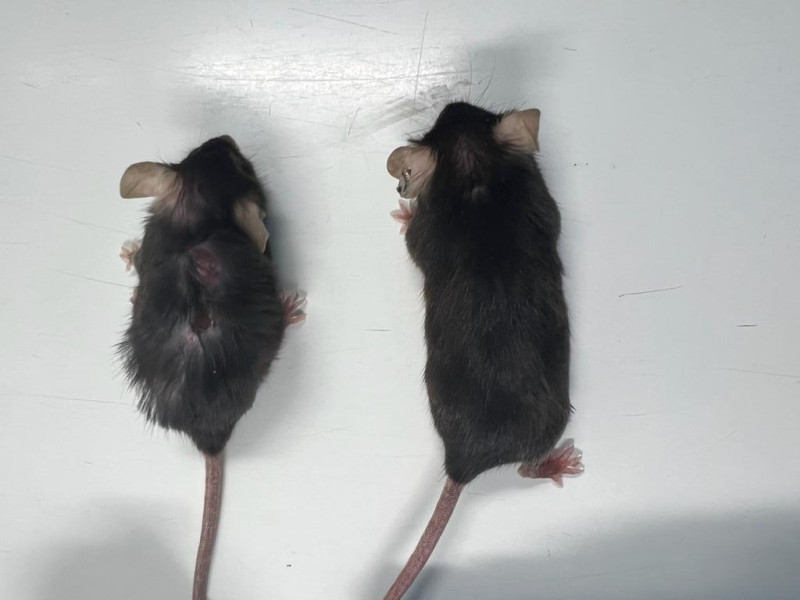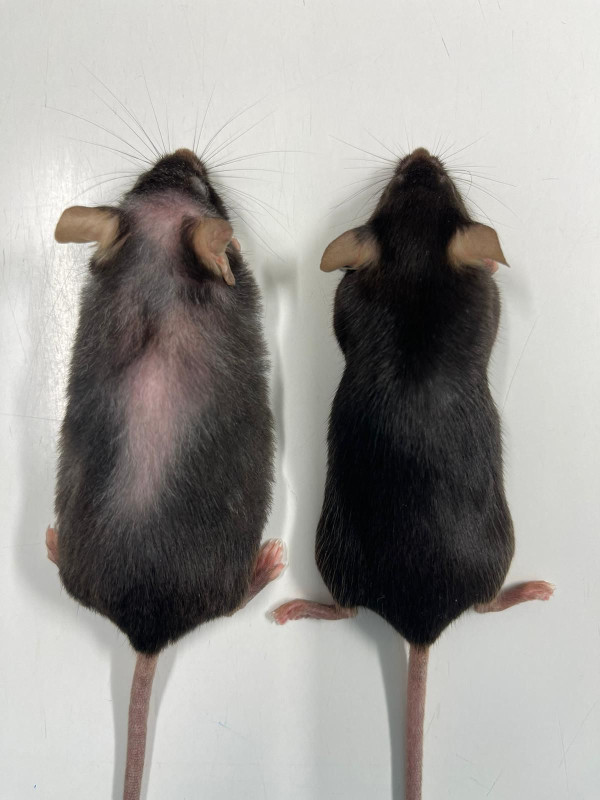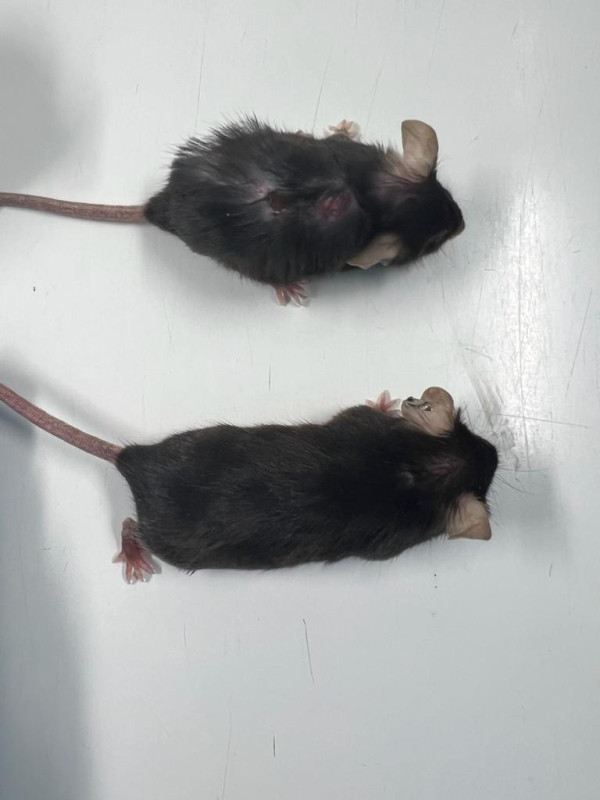Scientists at the Medical Research Council Laboratory of Medical Science and Imperial College London have discovered that ‘switching off’ a protein called IL-11 can significantly increase the healthy lifespan of mice by almost 25%. The scientists, working with colleagues at Duke-NUS Medical School in Singapore, tested the effects of IL-11 by creating mice that had the gene producing IL-11 (interleukin 11) deleted. This extended the lives of the mice by over 20% on average. They also treated 75-week-old mice — equivalent to the age of about 55 years in humans — with an injection of an anti-IL-11 antibody, a drug which stops the effects of the IL-11 in the body.

Identical twin mice of the same age. The mouse on the left has aged normally without intervention. The mouse on the right received anti-IL-11 antibody treatment from 55 weeks, the equivalent of middle age in a mouse.
The treatment largely reduced deaths from cancer in the animals, as well as reducing the many diseases caused by fibrosis, chronic inflammation and poor metabolism, which are hallmarks of ageing. There were very few side effects observed.

Professor Stuart Cook, from the Medical Research Council Laboratory of Medical Science (MRC LMS), Imperial College London and Duke-NUS Medical School in Singapore, who led the study, said:
“These findings are very exciting. The treated mice had lesser cancers, and were free from the usual signs of ageing and frailty, but we also saw reduced muscle wasting and improvement in muscle strength. In other words, the old mice receiving anti-IL11 were healthier.”
“Previously proposed life-extending drugs and treatments have either had poor side-effect profiles, or don’t work in both sexes, or could extend life, but not healthy life, however this does not appear to be the case for IL-11.”
“While these findings are only in mice, it raises the tantalising possibility that the drugs could have a similar effect in elderly humans.
Anti-IL-11 treatments are currently in human clinical trials for other conditions, potentially providing exciting opportunities to study its effects in ageing humans in the future.

Twin mice show effect of knocking out the gene for IL-11 (right) in comparison to a normal mouse of the same age. Obesity and other hallmarks of multi morbidity were reduced in the knock-out mouse
Effects of genetically removing the IL-11 gene
In the paper, Stuart and his team from the LMS Laboratory of Medical Sciences and Duke University showed that mice which had had the IL-11 gene “knocked out” were much longer lived and healthier than their counterparts.
This picture shows twin mice of exactly the same age.The mouse on the left is a normal, elderly mouse. The one on the right, despite being genetically identical with the exception of it’s missing Il-11 gene, is not obese and the paper showed that other hallmarks of ageing were reduced.
Professor Cook and his team have been investigating IL-11 for many years and in 2018 they were the first to show that IL-11 is a pro-fibrotic and pro-inflammatory protein, overturning years of incorrect characterisation as anti-fibrotic and anti-inflammatory.
Previously, scientists have posited that IL-11 is an evolutionary hangover in humans, as while it is vital for limb regeneration in some animal species, it is thought to be largely redundant in humans.
However, after about the age of 55 in humans, more IL-11 is produced and past research has linked this to chronic inflammation, fibrosis in organs, disorders of metabolism, muscle wasting (sarcopaenia), frailty, and cardiac fibrosis. These conditions are many of the signs we associate with ageing.
When two or more such conditions occur in an individual, it is known as multimorbidity, which encompasses a range of conditions including lung disease, cardiovascular disease, diabetes, vision and hearing decline and a host of other conditions.

Identical twin mice of the same age. The mouse on the top has aged normally without intervention. The mouse on the bottom received anti-IL-11 antibody treatment from 55 weeks, the equivalent of middle age in a mouse
Effects of giving anti-IL-11 antibody treatment to normal mice.
After showing the effects in the genetic knock-out mice, the team used an antibody to IL-11 as a treatment, given to normal mice at the equivalent of mid-life, around 55 in humans. The antibody neutralises the effects of naturally occurring IL-11, which is low in both mice and humans in childhood, but begins to rise in middle-ages. When they gave middle-aged mice the antibodies they found that they extended their lifespan, as with the knock-out mouse, but critically, extended healthy lifespan. The treated mice had many fewer cancers and many of the hallmarks associated with age, like obesity and fibrosis and other conditions caused by chronic inflammation, were all reduced. The picture on the left shows a normal but elderly mouse at the top, and its identical twin sister of the same age, but treated with the antibody, on the bottom.
These results give the tantalising potential of a future treatment for multi morbidity, considered the biggest healthcare challenge of the 21st century.
Professor Cook said: “The IL-11 gene goes up in all tissues in the mouse with age. When it gets turned on it causes multimorbidity, which is diseases of ageing and loss of function across the whole body, ranging from eyesight to hearing, from muscle to hair, and from the pump function of the heart to the kidneys.”
Multimorbidity and frailty are acknowledged to be among the biggest global healthcare challenges of the 21st century, according to many leading health bodies, including the NHS, and WHO. Although clinical trials would have to be carried out for such a treatment to be made available for humans, anti-IL11 antibody treatments are already being trialled for use in specific diseases caused by fibrosis and so far, the early trial data suggest they are safe.
Currently, no treatment for multimorbidity is available, other than to try to treat the separate multiple underlying causes individually.
The study entitled “Inhibition of IL-11 signalling extends mammalian healthspan and lifespan” will be published in Nature on 17 July 2024 at 16:00 (London time). Link once online: https://www.nature.com/articles/s41586-024-07701-9.
